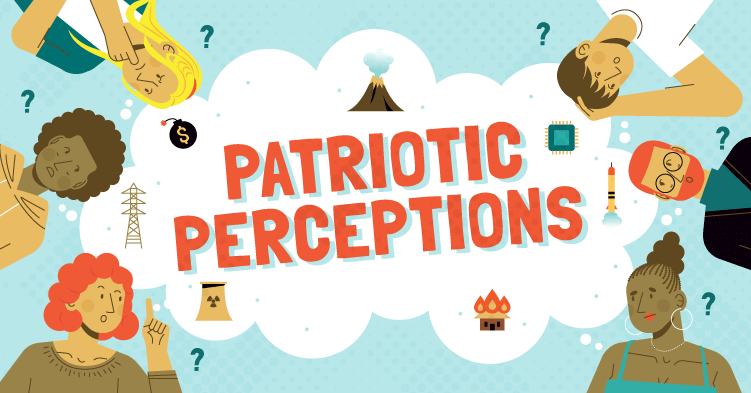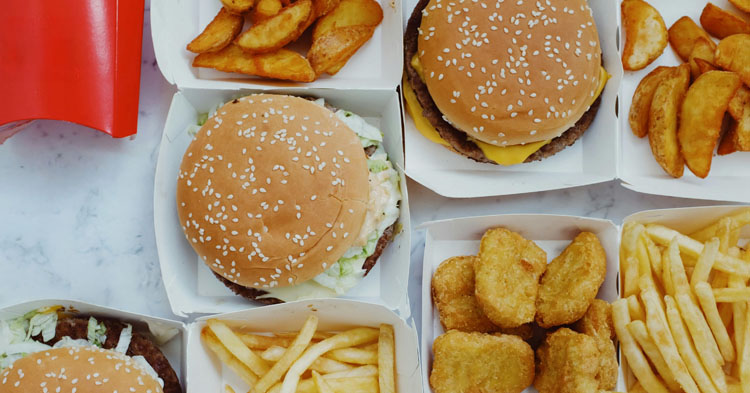Exploring a new country and immersing yourself in the local culture is a fantastic way of learning about the world. Unfortunately, many Americans have never had the opportunity — one in four has never left the country, and 63% don’t have a valid passport.
From the huge expense to trouble getting time off, traveling is not always an option. Instead, asking questions is a great way to find out anything you want to know about another country and its culture.
Whether you’re pondering the politics of Peru or querying the currency in Cambodia, most people that want to find something out quickly will turn to Google Search, which dominates the search engine market with an 87% share of users. With this in mind, we analyzed the most common Google Search queries made in the U.S. to find out what Americans want to know the most about every country in the world.
What We Did
For each country and U.S. state, we input the phrase “why does [country/U.S. state]” into the Keywords Explorer function on Ahrefs, a search engine research tool. We then found the question that had the highest number of Google searches in the U.S.
Key Findings
- The U.S. commonly asks about politics, industry, money, languages, holidays and cultural differences.
- Americans want to know why some countries are connected politically or economically to the U.S.
- Some of the most common questions the U.S. asks about African countries relate to languages.
- Americans want to learn the reasons behind international conflict in the Middle East and Central Asia.
The Most Common Questions America Asks About Other Countries
One of the best ways of finding out more about another country or culture is by asking questions, and our map below reveals the exact questions the U.S. most commonly asks about 194 countries around the world. Read on to find out America’s burning questions about each country broken down by continent.
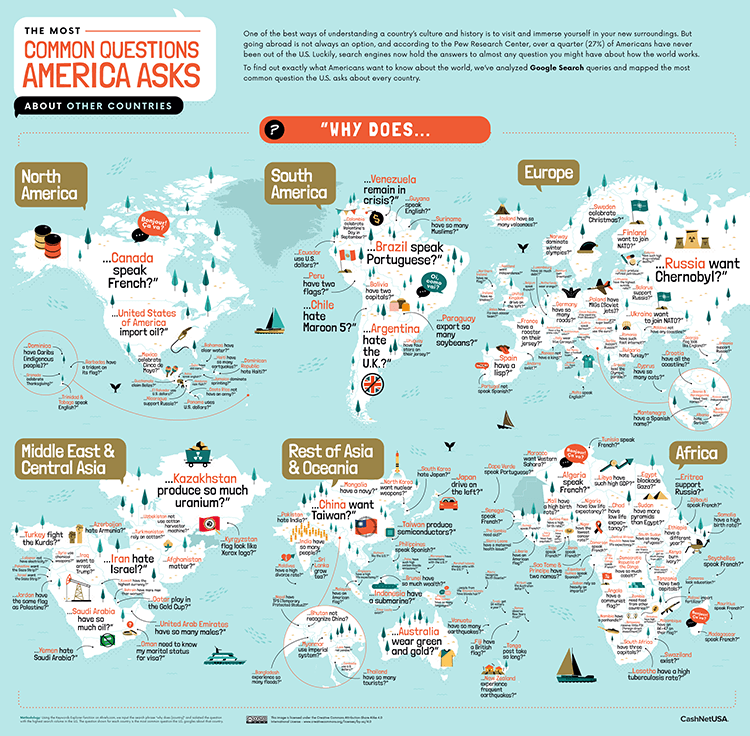
Click here to see the image in full size
The Most Common Questions America Asks About Europe
With so many cultural differences between the U.S. and Europe, it’s only natural that Americans have lots of questions about their cousins across the pond. Of all European countries, the U.S. has a particularly special relationship with the U.K. According to our research, the most common question Americans ask online about this island nation is, “why does [the] United Kingdom drive on the left?”
While it may seem odd, the U.K. is one of over 70 countries in the world where people drive on the left. The practice dates back to Roman times when soldiers needed to keep their right hands free for swords, but the rule only became enshrined in British law in 1835 to reduce traffic congestion.
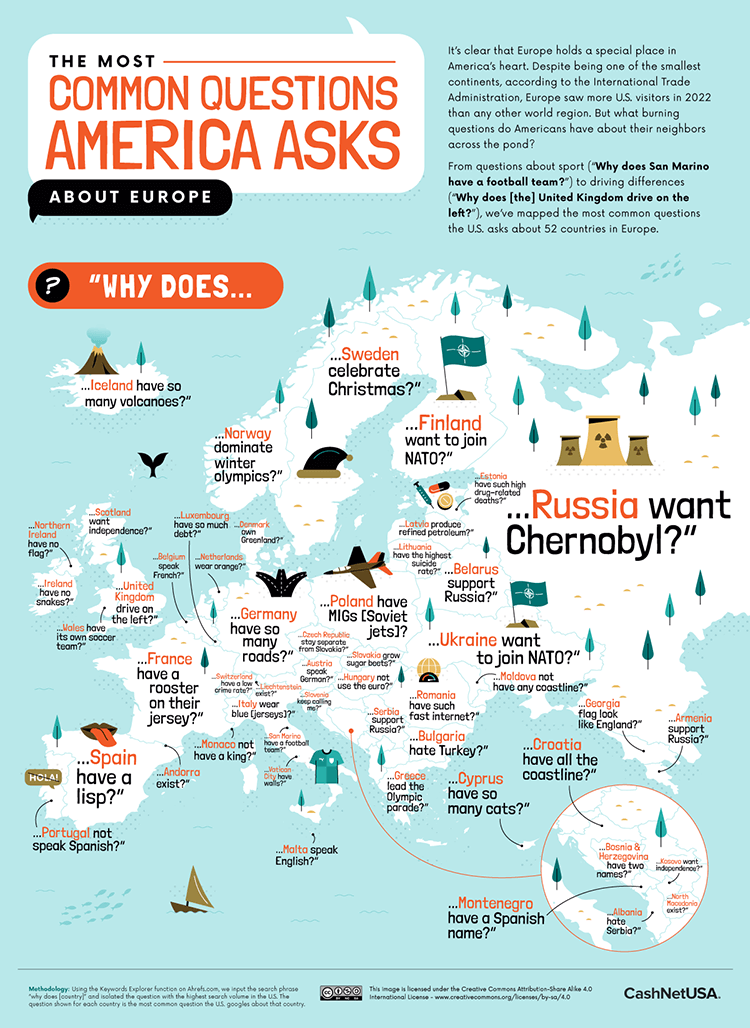
Click here to see the image in full size
Another compelling question asked is, “Why does Cyprus have so many cats?” With an estimated cat population of 1.5 million (outnumbering humans), this island country in the Mediterranean Sea indeed has a lot of cats — but nobody knows for certain where they came from originally. Local legends include the story of Saint Helena of Constantinople sending cat-filled boats to the island in the 4th century AD to chase a snake infestation out of a local monastery.
The Most Common Questions America Asks About North America
When Americans do travel abroad, their top two destinations of choice are on the same continent (Mexico and Canada). Our research reveals the most common questions the U.S. googles about its North American neighbors, covering a wide range of topics, including flags, languages and holidays.
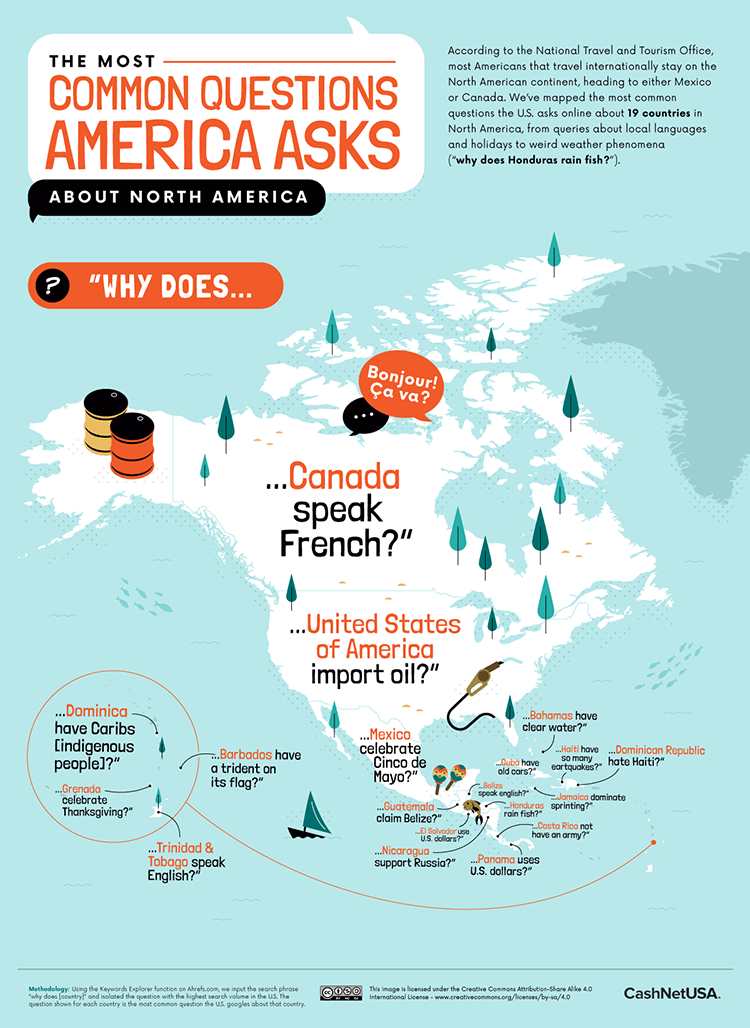
Click here to see the image in full size
Perhaps the most bizarre of the bunch is, “why does Honduras rain fish?” This question refers to the lluvia de peces (rain of fish) phenomenon, said to occur once or twice a year in the small Honduran town of Yoro. One explanation given by scientists is that small tornadoes that form over the sea (called waterspouts) are picking up fish from the Atlantic Ocean and then showering them on the town.
The Most Common Questions America Asks About South America
Among the most common questions that the U.S. asks about South America are questions about language (for example, “why does Brazil speak Portuguese?”), local economy (“why does Paraguay export so many soybeans?”) and pop culture quirks (“why does Chile hate Maroon 5?”).
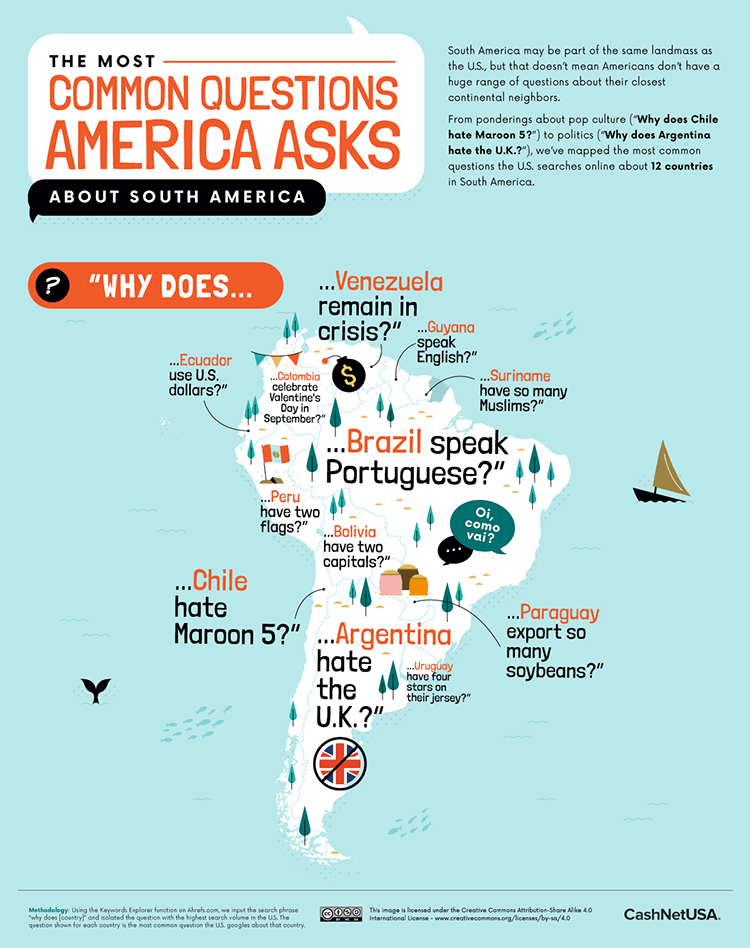
Click here to see the image in full size
The most common question that the U.S. asks online about Colombia is, “why does Colombia celebrate Valentine’s Day in September?” Most of the world knows February 14 as Valentine’s Day. Still, Colombia instead celebrates El Dia de Amor y Amistad (the day of love and friendship) on the third Saturday of September every year. The change was made in 1969 to better fit around school holidays and because local traders of flowers and chocolates saw better business then.
The Most Common Questions America Asks About The Middle East & Central Asia
When it comes to the Middle East and Central Asia, our research reveals the curiosity Americans have for the expansive region, including questions about flags (for example, “why does Jordan have the same flag as Palestine?”), economy (“why does Turkmenistan rely on cotton?”) and more than one question about international tensions and war (“why does Iran hate Israel?,” “why does Turkey fight the Kurds?”).
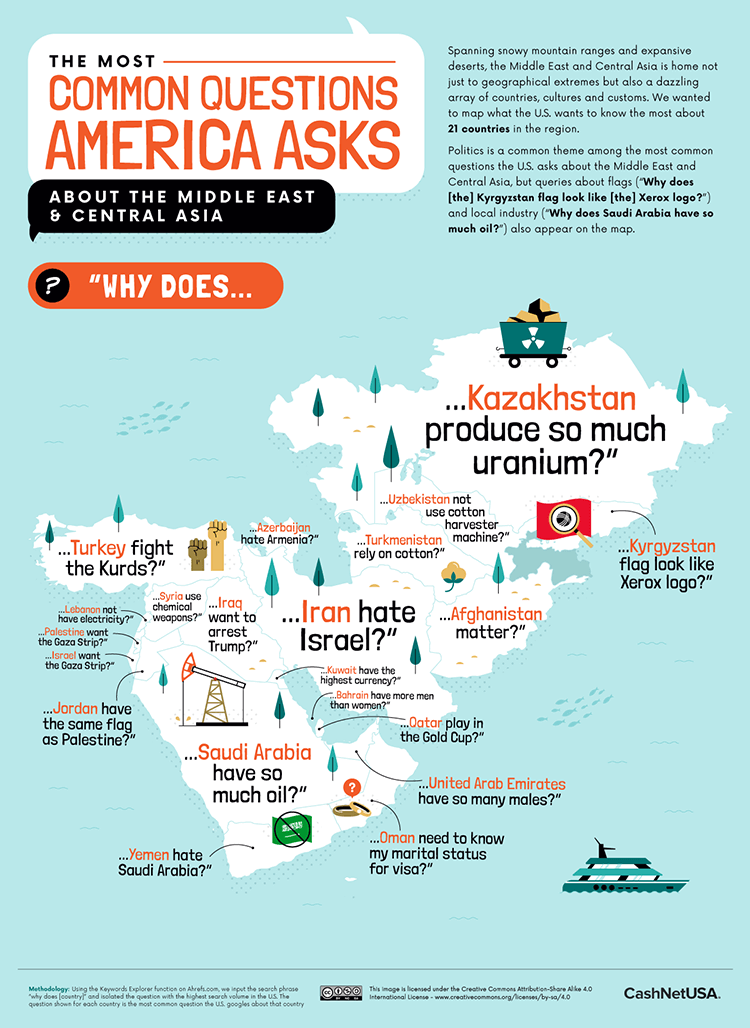
Click here to see the image in full size
One of the most interesting questions is, “why does Bahrain have more men than women?” 63% of Bahrain’s population are indeed men, making the country one of the most gender-imbalanced in the world. One reason behind the disparity is the country’s large population of male migrant workers.
The Most Common Questions America Asks About the Rest of Asia & Oceania
Spanning a huge range of countries and cultures, we next focused our research on the rest of Asia and Oceania, the biggest country of which, Australia, was once found to be the top dream destination for Americans. Among many other topics, our map reveals that the U.S. asks questions about local industries (for example, “why does Taiwan produce semiconductors?”), international relations (“why does Bhutan not recognize China?”) and country-specific quirks (“why does Tonga post take so long?,” “why do people from the Solomon Islands have blonde hair?”).
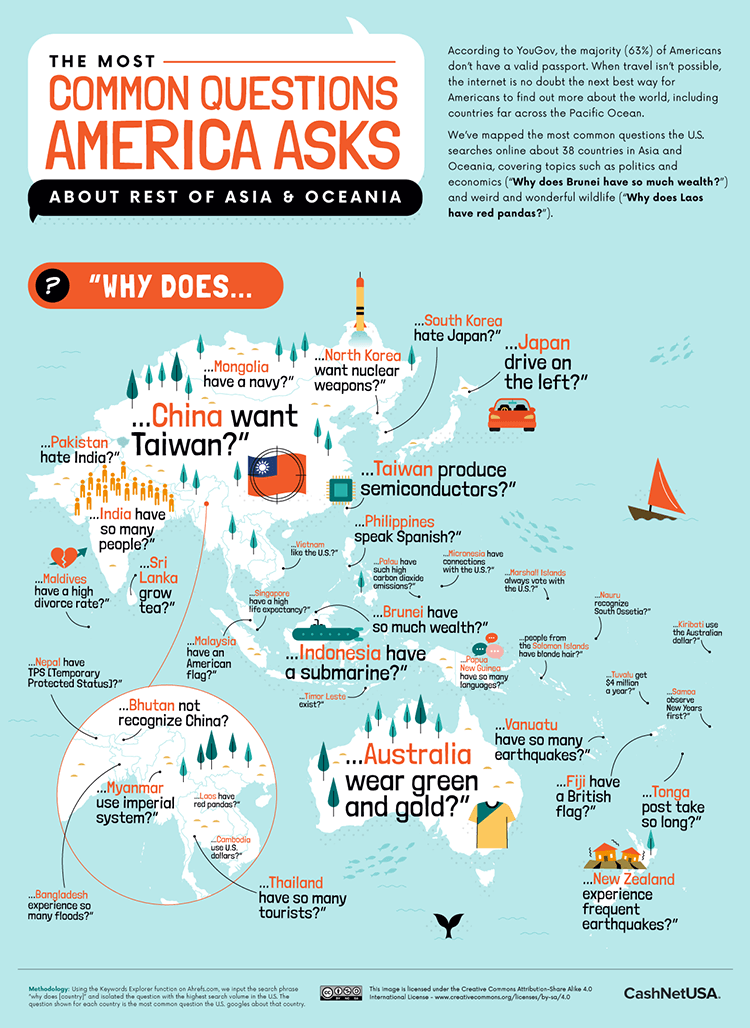
Click here to see the image in full size
Some questions relate to a country’s relationship with the U.S., including, “why do the Marshall Islands always vote with the U.S.?” The Marshall Islands fell under U.S. control during World War II. Though now an independent country, it is still part of the Compact of Free Association that ensures U.S. protection and financial assistance. The country’s relationship with the U.S. has seen the Marshall Islands frequently vote with the U.S. on international politics.
The Most Common Questions America Asks About Africa
Our analysis of Google searches made in the U.S. reveals the most common question Americans have about each African country. The top question in several countries asks why French, Spanish and Portuguese are spoken locally. The French language, in particular, is spoken by 141 million people in Africa and was brought to the continent through French and Belgian colonization. Portuguese in Cape Verde and Spanish in Equatorial Guinea have similar roots.
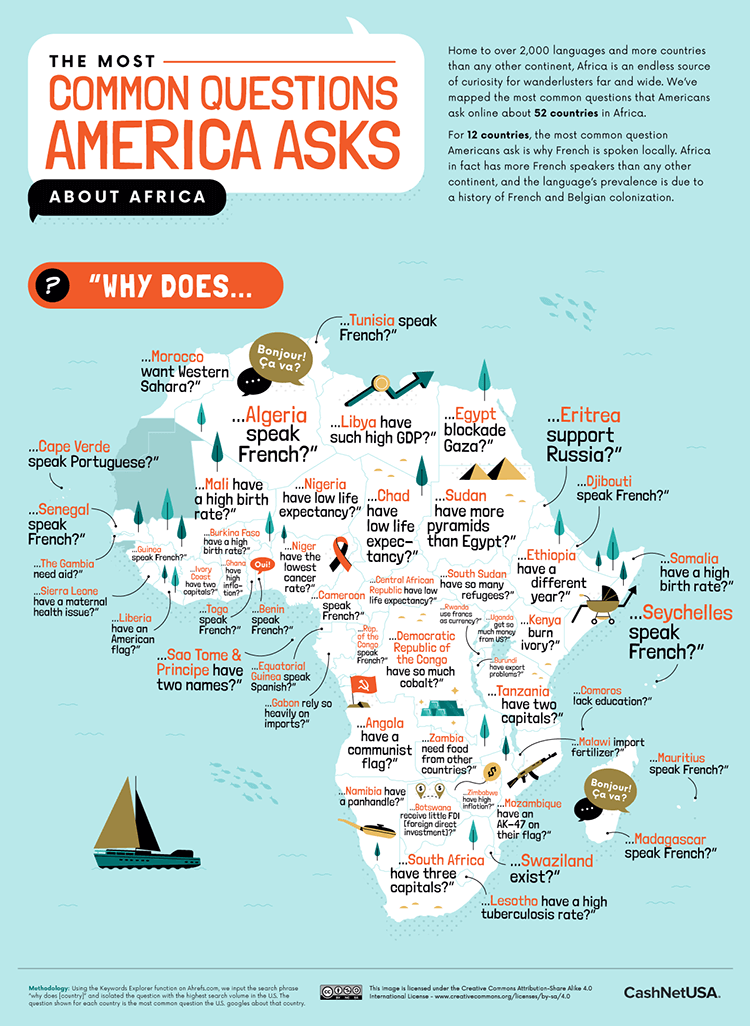
Click here to see the image in full size
Other questions reference topics like the local economy (for example, “why does Malawi import fertilizer?”), healthcare (“why does Sierra Leone have a maternal health issue?”) and landmarks (“why does Sudan have more pyramids than Egypt?”). It may surprise many people to find out that Sudan has pyramids at all, built by the ancient Kushite kingdoms a thousand years after the Egyptians.
The Most Common Questions America Asks About Each State
As one of the biggest and most populated countries on the planet, it’s easy to see why Americans have plenty of questions about their home country. For each state, we’ve mapped the most commonly asked question that Americans put to Google Search.
Many relate to politics (for example, “why does Minnesota vote democrat?”) and the economy (“why does South Dakota have no income tax?”), while others reference state-specific quirks (“why does Wyoming have red roads?”) and geography (“why does Kansas have a bite in its border?”).
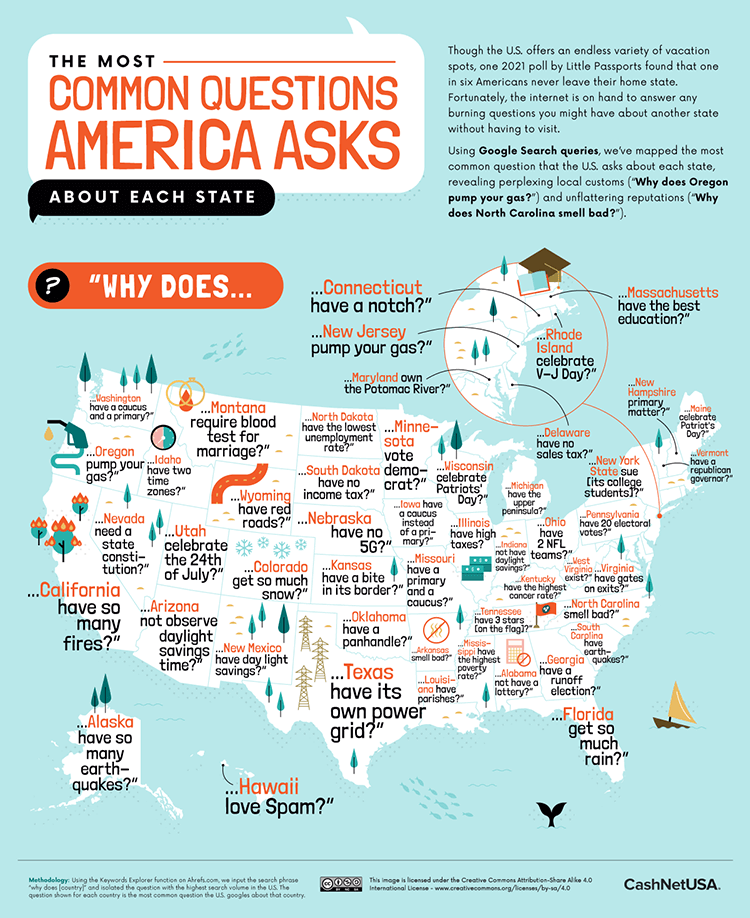
Click here to see the image in full size
The top question for New Jersey and Oregon is why you’re not allowed to pump your own gas there. New Jersey and Oregon are the only two states in the country where local laws dictate that only the service attendant can pump a vehicle with gas (rather than the driver). Both laws stem from safety concerns and the desire to protect service attendants’ jobs. Though the rules are more relaxed in rural Oregon, a violation of this law can land you a fine of up to $500 in both states.
The Best Way to Find Out About the World Is by Asking Questions
From breathtaking national parks to iconic cityscapes, the endless opportunities for adventure in the U.S. is one reason why it is one of the most visited tourist destinations in the world — and that’s just as well for Americans who have only ever been able to vacation within its borders.
One unique factor barring Americans from traveling the world is that the U.S. is one of the only countries in the world that doesn’t federally guarantee employees a minimum amount of paid vacation time. Most Americans, when they do travel internationally, opt for either Mexico or Canada.
Luckily, the internet offers anyone with access the ability to find out more about other countries and cultures, from VR-powered virtual vacations to trusty Google Search, with our research revealing the rich variety of questions about the world that Americans ask the search engine.
Novelist Thomas Berger once said: “The art and science of asking questions is the source of all knowledge.” In other words, whatever you want to know, the best way to find out is to ask! So go forth and google — and use their tips and tricks to level up your search.
Methodology & Sources
For each country and U.S. state, we input the search phrase “why does [country/U.S. state]” into the Keywords Explorer function on Ahrefs. We then isolated the question that had the highest search volume in the U.S., i.e., the most common question Americans ask about that country/state. Our data was collected in August 2022.
